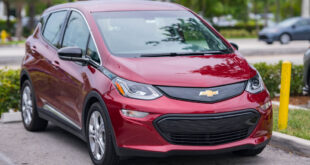Electric Car Features Comparison: Choosing the Best EV Electric vehicles (EVs) are transforming the automotive industry with their eco-friendly technology and advanced features. If you’re considering an electric car, understanding its key features is crucial. This Electric Car Features Comparison guide will help you choose the best EV by comparing range, battery life, charging speed, safety features, and more.
1. Battery Performance and Range
The battery is the heart of an electric vehicle. Different EVs come with various battery capacities, affecting their driving range and performance.
Battery Types
- Lithium-ion Batteries: Most common, lightweight, and long-lasting.
- Solid-State Batteries: The next-generation technology, offering higher energy density and faster charging times.
- Nickel-Metal Hydride Batteries: Used in hybrids, but less efficient for fully electric cars.
Range Comparison
- Tesla Model S: Up to 405 miles per charge.
- Lucid Air: 520 miles, currently the longest range.
- Chevrolet Bolt EV: 259 miles, affordable but decent range.
- Nissan Leaf: 212 miles, good for city driving.
Factors Affecting Range
- Driving Style: Aggressive acceleration reduces range.
- Weather Conditions: Cold temperatures decrease battery efficiency.
- Payload: Heavier loads consume more power.
2. Charging Speed and Infrastructure
Charging speed is an essential factor when choosing an EV. The faster an EV charges, the more convenient it becomes for long trips.
Types of Charging
- Level 1 (120V): Standard home outlet, takes 8–20 hours for a full charge.
- Level 2 (240V): Home and public charging stations, 4–8 hours for a full charge.
- DC Fast Charging: Provides 80% charge in 30–60 minutes.
Best EVs for Fast Charging
- Tesla Model 3: 250 kW fast-charging capability.
- Porsche Taycan: Ultra-fast 270 kW charging.
- Hyundai Ioniq 5: 800V system allows 10–80% charge in 18 minutes.
Availability of Charging Stations
- Tesla Supercharger Network: 50,000+ locations worldwide.
- Electrify America: 3,500+ fast chargers in the U.S.
- EVgo and ChargePoint: Expanding networks for public charging.
3. Performance and Acceleration
EVs are known for their instant torque and smooth acceleration. Let’s compare performance across different models.
0-60 MPH Acceleration
- Tesla Model S Plaid: 1.99 seconds, the fastest production EV.
- Rimac Nevera: 1.85 seconds, a hypercar-level speed.
- Lucid Air Dream Edition: 2.5 seconds, luxury with power.
- Hyundai Ioniq 5: 5.2 seconds, great for daily driving.
Handling and Driving Experience
- Low Center of Gravity: Due to battery placement, EVs offer better stability.
- Regenerative Braking: Recovers energy when slowing down.
- One-Pedal Driving: Reduces the need for frequent braking.
4. Safety and Autonomous Features
EVs come equipped with advanced driver-assistance systems (ADAS) for improved safety.
Top Safety Features in EVs
- Autonomous Emergency Braking (AEB): Prevents collisions.
- Adaptive Cruise Control: Adjusts speed based on traffic.
- Lane Keeping Assist: Helps maintain lane discipline.
- Blind Spot Monitoring: Alerts when a vehicle is in your blind spot.
Top-Rated Safe EVs
- Tesla Model Y: 5-star safety rating from NHTSA.
- Rivian R1T: Rugged EV with strong crash protection.
- Volvo EX90: Advanced driver-assistance systems.
5. Interior and Comfort Features
EVs are not just about performance; they also offer high-tech, comfortable interiors.
Best Interior Features
- Tesla Model S: Minimalist design with a 17-inch touchscreen.
- Mercedes EQS: Hyperscreen dashboard, luxury materials.
- BMW iX: Premium seating with sustainable materials.
- Ford Mustang Mach-E: Spacious with a frunk (front trunk).
6. Pricing and Cost of Ownership
EV prices vary based on range, features, and brand.
Price Comparison
- Budget EVs ($25,000 – $40,000): Nissan Leaf, Chevrolet Bolt.
- Mid-Range EVs ($40,000 – $70,000): Tesla Model 3, Ford Mustang Mach-E.
- Luxury EVs ($70,000+): Lucid Air, Porsche Taycan, BMW iX.
Cost Savings
- Lower Maintenance Costs: No oil changes or exhaust system repairs.
- Tax Incentives: Federal and state incentives reduce costs.
- Lower Fuel Costs: Electricity is cheaper than gasoline.
10 Essential Tips for Choosing an Electric Car
- Determine your daily driving range needs.
- Check the availability of charging stations in your area.
- Compare battery life and warranty (usually 8 years).
- Evaluate charging speed and home charging options.
- Consider the resale value of different EV brands.
- Look for government incentives to save money.
- Test drive to experience ride quality and features.
- Choose an EV with over-the-air (OTA) software updates.
- Compare safety ratings and driver assistance features.
- Research total cost of ownership, not just purchase price.
10 Frequently Asked Questions (FAQ)
- How long do EV batteries last?
Most EV batteries last 10–15 years or 100,000–200,000 miles. - Can I charge an EV at home?
Yes, with a Level 2 charger, it takes 4–8 hours for a full charge. - Are electric cars good for long trips?
Yes, with fast chargers available, long-distance travel is easier. - How much does it cost to charge an EV?
Charging at home costs about $10–$15 for a full charge. - Do electric cars require maintenance?
EVs have fewer moving parts, meaning lower maintenance costs. - Which EV has the longest range?
The Lucid Air currently holds the record with 520 miles per charge. - Can I charge an EV in the rain?
Yes, EV chargers are designed to be weatherproof. - What is regenerative braking?
It converts kinetic energy into electricity, extending battery life. - Do EVs lose range in cold weather?
Yes, battery efficiency drops by 10–20% in freezing temperatures. - Are EVs safer than gas cars?
Yes, most EVs have higher safety ratings due to advanced features.
Conclusion
Electric vehicles are the future of transportation, offering superior performance, lower running costs, and eco-friendly benefits. Choosing the right EV depends on your needs, such as battery range, charging speed, safety features, and price.
By understanding the key differences in Electric Car Features Comparison, you can make an informed decision that suits your lifestyle. Whether you’re looking for a budget-friendly option or a high-performance luxury EV, there’s a perfect electric car for you! 🚗⚡
 oto car insurance used car repair
oto car insurance used car repair
